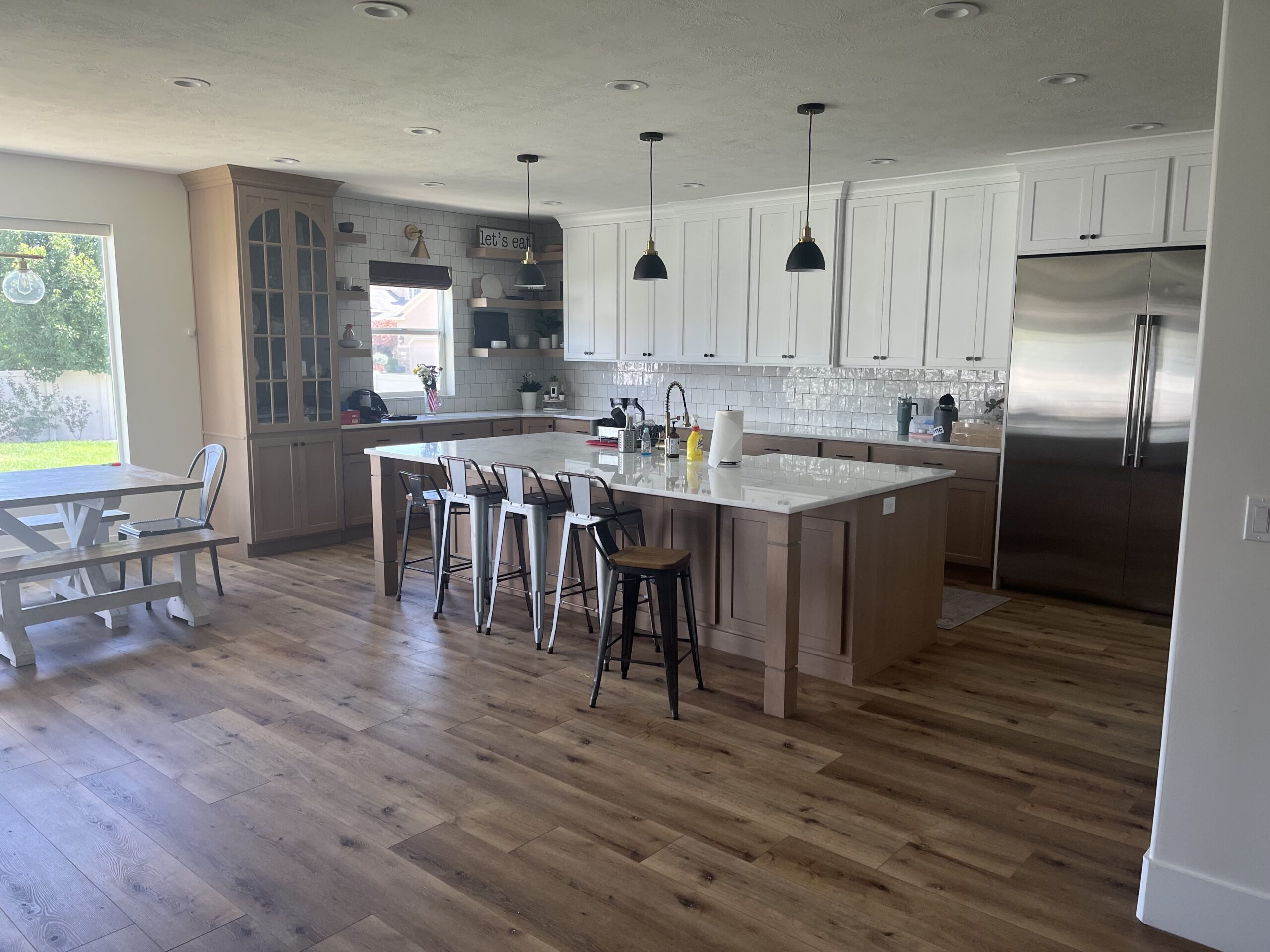Building your dream home is an exciting journey, but it starts with finding the right builder. With so many choices, it can feel overwhelming to figure out who to trust with such an important project. That’s why we’ve created this guide to help you navigate the process and choose a builder who will bring your vision to life with professionalism, transparency, and care.
Tip 1: Do Your Homework on the Builder’s Reputation
Before you commit to a builder, one of the most important things you can do is investigate their reputation. You want to know who you’re dealing with before you sign any contracts or make any payments. By spending some time researching your builder, you can avoid the headaches and financial risks that come with working with a company that doesn’t deliver on its promises.
Check Online Reviews and Testimonials
Start by looking at online reviews. Websites like Google, Yelp, and Houzz are great places to find feedback from past clients. Look for patterns in the reviews: Do people mention the same problems repeatedly? Are there common compliments about the builder’s quality, communication, or timeliness? A few negative reviews aren’t necessarily a deal-breaker, but if you see recurring issues, consider it a red flag.
Don’t just focus on star ratings—read through the detailed reviews to get a sense of how the builder handles challenges. Everyone hits bumps in the road during a construction project, but trustworthy builders know how to navigate them with transparency and professionalism.
Ask for References
Even if the builder has great reviews online, it’s a good idea to ask for references directly. A reputable builder should have no problem providing a list of previous clients for you to contact. When you speak to past clients, ask specific questions, such as:
- How did the builder handle changes to the project?
- Were there any delays, and if so, how were they managed?
- Did the builder communicate clearly throughout the process?
Hearing firsthand from someone who has been through the process can provide invaluable insights into what you can expect.
Look for Industry Accolades and Awards
Another way to gauge a builder’s reputation is by looking for industry recognition. Builders who have received awards or certifications from respected organizations demonstrate a commitment to excellence. Membership in local and national building associations, such as the National Association of Home Builders (NAHB), is also a good sign that the builder adheres to high industry standards.
Evaluate Their Experience
A builder’s longevity and experience can also tell you a lot about their reputation. How long have they been in business? Do they specialize in the type of home you want to build? Builders who have been around for a long time and have a portfolio of successful projects tend to be more reliable. Look for builders with experience in your area, as they’ll be familiar with local building codes and challenges specific to the region.
Our Experience
At Roots Builders, we recently worked with a family who had previously been let down by another builder. They came to us after doing their homework—checking our reviews, speaking to past clients, and visiting one of our completed projects. This time, they didn’t leave anything to chance. Their thorough research reassured them that we were the right choice, and by the end of the project, they were thrilled with the result. This is exactly why doing your homework matters—it gives you peace of mind that you’re working with a builder you can trust.
Final Thought
Doing your homework upfront may take some time, but it’s time well spent. A builder’s reputation is one of the most reliable indicators of whether they’ll be a good partner in your home-building journey. Trust your instincts, dig deep into the builder’s track record, and don’t be afraid to ask tough questions. In the end, it’s worth the effort to ensure you’re working with someone who will treat your home with the care and dedication it deserves.
Tip 2: Meet the Builder in Person
After doing your homework and narrowing down your list of potential builders, the next critical step is meeting them in person. While online reviews and references can tell you a lot about a builder, nothing compares to a face-to-face meeting. This is your opportunity to get a sense of who the builder is and how they operate. Trust is built through communication, and meeting in person allows you to gauge their professionalism, transparency, and whether they genuinely care about your project.
Gauge Their Professionalism
You should also ask about their building process and how they handle various stages of construction. Do they have a structured process for communicating progress or handling unforeseen issues? The way they answer these questions will give you insight into their organizational skills and reliability.
When you meet with a builder, notice how they present themselves. Are they on time for the meeting? Do they come prepared, with documentation or portfolios of their work? A professional builder should take your meeting as seriously as you do, showing you that your project is a priority to them.
Ask the Right Questions
Your meeting is your chance to ask the builder detailed questions about their experience, processes, and how they approach challenges. Some key questions to consider:
- How do you handle changes to the original plan during the build?
- What’s your process for managing delays or unexpected issues?
- How often can I expect updates, and who will be my point of contact?
These questions not only give you more information about how they operate but also show whether they are transparent and willing to communicate openly. A trustworthy builder will appreciate these questions and answer them clearly.
Pay Attention to How They Listen
Communication is a two-way street. During the meeting, pay attention to how well the builder listens to you. Are they actively listening and understanding your vision, or do they seem more focused on their own agenda? A builder who listens carefully will ask follow-up questions, clarify details, and ensure they fully understand your goals for the project.
A good relationship with your builder is built on mutual understanding. If the builder takes time to listen to your needs and preferences, it’s a good sign that they will take the same care throughout the building process.
Trust Your Gut
Sometimes, trust comes down to your instincts. Do you feel comfortable with this person? Do you get the sense that they care about your project and want to do a good job? Meeting a builder in person can give you a gut feeling about whether they’re the right fit for you. If something feels off or if they seem evasive, it may be a sign to keep looking.
Our Experience
At Roots Builders, we believe that every successful project starts with a personal connection. One of our clients, Sarah, met with several builders before choosing us. She mentioned that while many builders had impressive portfolios, the real difference was how we made her feel heard. During our first meeting, we took the time to really understand her vision for the home and what was most important to her. That initial connection made all the difference and gave her the confidence that we were the right partner for the project.
Final Thought
Meeting your builder in person is one of the most important steps in the decision-making process. It gives you the opportunity to assess their professionalism, communication style, and whether they genuinely care about your project. By asking the right questions and trusting your instincts, you’ll be better equipped to make a decision that ensures your home-building journey is smooth, transparent, and ultimately successful.

Tip 3: Check for Proper Licensing and Insurance
When it comes to building your dream home, there are few things more important than making sure your builder is properly licensed and insured. It might seem like a formality, but it’s crucial for your protection as a homeowner. Builders who are licensed and insured demonstrate their commitment to doing things the right way, and working with them ensures that you’re protected against potential legal or financial issues that could arise during the building process.
Why Licensing Matters
A valid license shows that the builder meets state or local requirements for skills, experience, and education. In Utah, for example, builders need to hold a contractor’s license, which ensures they have passed exams and met the necessary standards to legally perform construction work.
A licensed builder has been vetted by local authorities and understands the necessary building codes, regulations, and safety protocols. This is important because building without the proper knowledge can lead to costly mistakes or delays—problems that you, as the homeowner, would have to deal with.
What to Ask for Regarding Licensing
- Verify the license: Ask the builder for their license number and verify it through your state’s licensing board. In Utah, this can be done via the Utah Division of Occupational and Professional Licensing.
- Ask about subcontractors: If your builder is using subcontractors, make sure they’re licensed too. Your project is only as good as the people working on it.
- Check for special certifications: If your project involves specialized work, such as eco-friendly or energy-efficient building, ask if the builder has any certifications in those areas. This can give you additional peace of mind.
Why Insurance is Essential
Insurance is just as critical as licensing. It protects you, the homeowner, from financial liability if something goes wrong during the construction process. For example, if a worker is injured on your property, you don’t want to be held responsible for medical bills. Similarly, if there’s damage to your property during construction, insurance will cover the repairs.
There are two key types of insurance your builder should have:
- General liability insurance: This protects you if your property is damaged during the construction process. It covers costs for repairs or replacements due to accidents, faulty work, or other mishaps.
- Workers’ compensation insurance: This protects you from liability if a worker is injured on the job. It ensures that any medical expenses or lost wages are covered without affecting you financially.
What to Ask for Regarding Insurance
- Request proof of insurance: Your builder should provide you with a certificate of insurance, which shows that their coverage is current and adequate for the scope of your project.
- Verify the coverage: Don’t just take the builder’s word for it—call the insurance company to confirm that the policy is valid. Make sure it covers both general liability and workers’ compensation.
- Understand the limits: Ask about the coverage limits to make sure they’re sufficient for your project. A large custom home will require higher coverage limits than a smaller renovation project.
Our Experience
At Roots Builders, we’ve had clients tell us how relieved they were when they realized the importance of licensing and insurance. One client came to us after a terrible experience with an unlicensed contractor who didn’t have proper insurance. When a worker was injured on the job, the client was left with unexpected legal troubles and expenses. We helped them understand the value of working with licensed and insured builders, and since then, they’ve become one of our strongest advocates.
Final Thought
Checking for proper licensing and insurance isn’t just a formality—it’s essential to protecting your investment and ensuring the builder you choose is qualified to do the job right. Before you sign any contracts or commit to a project, make sure your builder is licensed and insured. It’s a simple step that can save you a lot of potential stress and costs down the road.
Tip 4: Ask About Clear Communication and Updates
When building your dream home, one of the most critical factors in ensuring a smooth, stress-free process is clear communication. Many of the horror stories you hear about bad building experiences boil down to poor communication. Whether it’s delays, budget overruns, or unforeseen issues, things can spiral out of control when communication breaks down. That’s why it’s important to ask upfront how your builder plans to keep you updated throughout the project.
Why Clear Communication Matters
Building a home is a complex, multi-step process that can span several months. During that time, there will inevitably be questions, decisions to make, and occasional challenges that arise. A trustworthy builder knows that keeping you in the loop is crucial to avoiding misunderstandings, delays, and frustration.
Good communication is about more than just giving updates—it’s about transparency. You want to work with a builder who will be open about progress, potential delays, and costs as they arise. This way, you’re never left in the dark, and you can make informed decisions as the project progresses.
What to Ask About Communication
Before you start working with a builder, ask how they plan to communicate with you throughout the project. Some key questions to consider:
- How often will you receive updates? A good builder will have a set schedule for providing updates, whether that’s weekly check-ins, milestone reports, or daily updates when critical work is being done.
- Who will be your main point of contact? It’s important to know who you’ll be communicating with, whether it’s the builder themselves or a project manager. Make sure this person is available to answer questions and address concerns in a timely manner.
- How will they communicate with you? Determine whether updates will be provided via phone calls, emails, or in-person meetings. Different clients prefer different methods, so make sure the builder’s communication style aligns with your preferences.
- How will unexpected issues be handled? Ask the builder how they plan to inform you of unexpected issues, such as delays or budget changes. The last thing you want is to be surprised by a major problem when it’s already too late to address it properly.
The Importance of Transparency
In addition to regular updates, you want a builder who is transparent about the entire process. From the initial estimate to the final walkthrough, your builder should be upfront about costs, timelines, and any potential risks involved in the project.
A builder who tries to gloss over potential challenges or avoids talking about delays may not be the most trustworthy partner. On the other hand, a builder who is honest about potential hiccups and explains how they will address them gives you confidence that your project is in good hands.
Our Experience
At Roots Builders, we pride ourselves on clear and consistent communication with our clients. One of our recent clients, Mike, had been through a nightmare build with another contractor who left him in the dark for weeks at a time. After switching to us, Mike appreciated how we provided weekly updates, held regular on-site meetings, and were transparent about every aspect of the build. When an unexpected delay arose due to material shortages, we immediately informed him, explained the situation, and adjusted the schedule accordingly. Mike told us that our communication made all the difference in restoring his trust in builders.
Final Thought
Clear communication is the cornerstone of a successful home-building project. By asking your builder the right questions upfront, you’ll be able to determine whether they’re committed to keeping you informed throughout the process. When communication is strong, you can move forward confidently, knowing that there won’t be any unpleasant surprises down the road. After all, your home is one of the biggest investments you’ll ever make, and you deserve a builder who values transparency as much as you do.

Tip 5: Request a Detailed Contract
Once you’ve done your homework, met with the builder, and confirmed they are licensed and insured, it’s time to get everything in writing. A detailed contract is the backbone of any successful building project. It outlines the expectations for both you and the builder, ensuring that everyone is on the same page. Having a thorough, clear contract helps prevent misunderstandings and provides legal protection for both parties.
Why a Detailed Contract Matters
A contract is more than just a formality—it’s a roadmap for the entire building process. Without a clear contract, you could be left guessing about timelines, costs, and what’s included in the scope of work. A detailed contract ensures that you know exactly what to expect and can hold the builder accountable if something doesn’t go according to plan.
A good contract protects both you and the builder by setting clear expectations. It minimizes the chances of disputes and makes it easier to resolve any issues that arise during construction. In short, it gives you peace of mind throughout the project.
What Should Be Included in the Contract?
To ensure that your contract covers all the important details, here are some key elements to include:
- Project Scope: The contract should clearly outline the full scope of work, including what’s being built, the materials being used, and the specific features of your home. Be as detailed as possible to avoid any ambiguity later on.
- Timeline: Include a detailed timeline that specifies when each phase of the project will be completed. This should also outline what happens in the event of delays and how those delays will be communicated to you.
- Payment Schedule: Your contract should include a clear payment schedule, detailing when payments are due and what each payment covers. This ensures that you’re only paying for work that has been completed to your satisfaction.
- Change Orders: Construction projects often require changes along the way. Make sure the contract includes a section on how change orders will be handled—specifically, how they will be documented, approved, and paid for.
- Warranties and Guarantees: The contract should outline any warranties on materials and workmanship, giving you peace of mind that if something goes wrong after construction, it will be covered.
- Termination Clauses: In the event that either party wants to back out of the contract, make sure there are clear guidelines for how this can happen. This can include conditions under which the contract can be terminated and any penalties for doing so.
Why You Shouldn’t Rely on Verbal Agreements
Verbal agreements can easily lead to misunderstandings, as people remember conversations differently or overlook key details. What might seem like a minor change in a casual conversation could turn into a costly mistake if it’s not documented properly. A detailed, written contract eliminates any ambiguity and ensures that both parties understand exactly what’s been agreed upon.
Even if you trust your builder, a formal contract protects both sides. It’s not about assuming something will go wrong—it’s about having a safety net in place just in case.
Our Experience
One of our clients, Dan, learned the importance of a detailed contract the hard way. Before working with Roots Builders, he hired another contractor who only provided a vague agreement with a few verbal promises. As the project progressed, delays started happening, and the costs quickly spiraled out of control. Because nothing was clearly documented, Dan had no recourse when the builder didn’t meet expectations. After that experience, Dan made sure to get everything in writing when he hired us, and the process went much more smoothly. A detailed contract kept us all on the same page and ensured his home was built on time and on budget.
Final Thought
A detailed contract is your best protection when building a custom home. It provides clarity, ensures accountability, and gives you peace of mind throughout the project. Don’t be afraid to ask your builder for a contract that covers all the essential details—it’s a sign that they are serious about delivering high-quality work and protecting your interests. By taking the time to craft a thorough contract, you’re setting yourself up for a smoother, more successful home-building experience.
Tip 6: Look for Builders Who Treat Your Project Like Their Own
When you’re building a custom home, you want more than just a builder who can get the job done. You want someone who treats your project with the same care and attention to detail as they would their own home. A trustworthy builder understands the emotional and financial investment you’re making and will approach your project with a level of care that reflects that understanding. Finding a builder who cares deeply about your home is essential to ensuring the final product meets, or even exceeds, your expectations.
What It Means to Treat Your Project Like Their Own
Builders who treat your project like their own aren’t just focused on finishing the job—they’re invested in every aspect of it. They care about the quality of materials, the craftsmanship, and even the small details that make your home truly special. This goes beyond simply meeting deadlines; it means being personally committed to the success of your project.
A builder who takes ownership of your project will:
- Pay attention to the details: They won’t cut corners or overlook small details. From the layout of the rooms to the quality of the finishes, they’ll ensure everything is done right.
- Communicate openly: They’ll keep you in the loop throughout the entire process and make sure your vision is at the forefront of every decision.
- Take pride in their work: A builder who treats your home as their own will feel a sense of pride in the final product, and this shows in the quality of their work.
Signs of a Builder Who Cares
During your initial meetings with potential builders, pay attention to how they talk about your project. Do they seem genuinely excited about the work? Do they ask questions to fully understand your vision? A builder who cares will take the time to listen to your ideas and make thoughtful recommendations to enhance your home.
Another sign is how they handle challenges. Every building project will face some kind of hurdle, whether it’s a delay in materials or an unforeseen structural issue. Builders who care about your project will tackle these problems head-on, finding solutions that prioritize quality and your satisfaction, rather than just looking for the quickest fix.
What to Look for in the Work They’ve Done
One of the best ways to gauge whether a builder truly cares about their projects is by looking at homes they’ve completed in the past. Visit homes they’ve built or ask for photos of previous projects. Pay attention to the craftsmanship and quality. Are the finishes done meticulously? Are the designs thoughtful and personalized? These are signs of a builder who takes ownership of their work and treats each project with care.
Our Experience
At Roots Builders, we treat every home we build as if it were our own. One of our clients, Lisa, came to us with a very specific vision for her family’s new home. She had worked with a different builder in the past who seemed indifferent about her project, leading to a disappointing result. This time, she wanted to make sure her builder cared as much about the details as she did. Throughout the process, we made sure to listen carefully to her ideas, and we didn’t hesitate to offer suggestions that we knew would enhance her design. The final result was a home that exceeded her expectations, and she told us she finally felt like her vision was fully realized. That’s what happens when a builder truly treats your home like their own.
Final Thought
Choosing a builder who treats your project like their own can make all the difference in the quality and experience of your home-building journey. These builders care deeply about the outcome and will go above and beyond to ensure your home is crafted with the highest level of care and attention. When a builder is personally invested in your project’s success, you can trust that every detail will be handled with the utmost care, and the end result will be a home that you love living in for years to come.
Conclusion: You Can Find a Builder You Can Trust
Building your dream home is one of the most significant investments you’ll ever make, both financially and emotionally. It’s a journey that requires careful planning, but most importantly, it requires finding a builder you can trust. Throughout this guide, we’ve shared seven essential tips to help you navigate the process and make an informed decision.
By doing your homework, meeting with potential builders, verifying their licensing and insurance, ensuring clear communication, requesting a detailed contract, and evaluating their past work, you’ve set yourself up for success. More than that, choosing a builder who treats your project like their own will give you peace of mind, knowing that every detail is handled with care and professionalism.
At Roots Builders, we understand that trust is at the heart of every successful project. We take pride in building strong relationships with our clients through transparency, open communication, and a genuine commitment to their vision. Our goal is to not only build your home but to make the experience as smooth and enjoyable as possible.
We encourage you to take the next step by reaching out for a consultation. Whether you’re just beginning to explore the idea of building or are ready to move forward, we’re here to guide you every step of the way. Let us help you build a home that you’ll love for years to come—crafted with the same care and attention we’d give our own.
Thank you for taking the time to read this guide. We look forward to helping you turn your dream home into a reality.
At Roots Builders, we’re ready to turn your vision into reality. Let’s make your dream home a reality, built with care, professionalism, and attention to detail.


